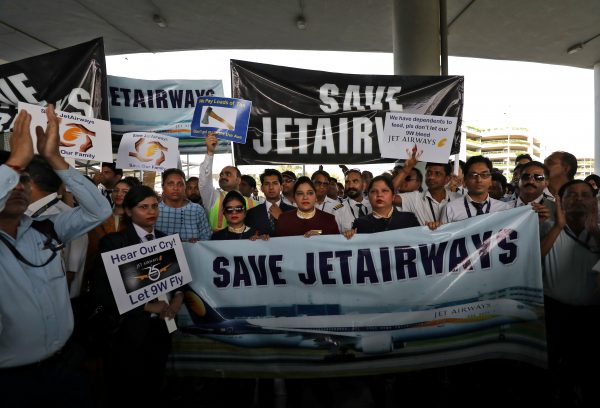A 2018 survey suggested that over 70 per cent of 18 to 21-year-olds and 65 per cent of 22 to 28-year-olds think it is ‘extremely’ or ‘fairly’ difficult to find a job. And most of those aged 21 or younger and not yet working expect a monthly salary of 30,000 rupees (US$434) or more, when most 22 to 28-year-olds actually earn under 20,000 rupees (US$289) per month.
Other constituencies that traditionally supported the BJP, such as petty traders in the informal sector, are disillusioned due to both the sudden demonetisation of high-denomination banknotes in 2016 and the haphazard implementation of the Goods and Services Tax in 2017. The urban middle classes historically inclined to the BJP are restless as well. The government has not provided them benefits like income tax rebates.
The government has offered sops to farmers but that will solve neither the longstanding decline of India’s agricultural sector nor lift falling farm incomes. For many constituents, especially in urban areas, the economy seems to be the Achilles’ heel of the BJP.
In February, the government released a Draft National e-Commerce Policy. Driven by the motto ‘India’s Data for India’s Development’, the policy intends to protect economically and strategically valuable data of Indian consumers and industries. It also provides breathing space to homegrown e-commerce platforms and small and medium-sized enterprises that are key to employment generation, but are struggling to recover from the twin blows of demonetisation and poorly devised tax reforms. Ostensibly aimed at supporting smaller domestic enterprises even at the cost of the budding strategic relationship with the United States, the policy favours Indian e-commerce giants-in-making.
The government’s attempt to steer Jet Airways, India’s oldest and second largest private carrier, out of bankruptcy is also seen as motivated by electoral considerations. Jet Airways is not new to political controversies though. Months ahead of the 2014 elections, the incumbent Congress government was accused of helping the airline secure investment from the Abu Dhabi-based Etihad Airways.
The latest instance of political support for Jet Airways must be understood from multiple perspectives. First, Indian governments have always tried to preserve scarce formal sector employment. Air India, the state carrier, is similarly kept afloat at enormous taxpayer cost. Second, the government is mindful of the impact of grounding Jet Airways on consumers and the tourism industry in the middle of summer vacations. Prices surged when Kingfisher Airlines ceased operations a few years ago. Jet Airways’ exit will further squeeze travellers with just three big players left in the market — IndiGo, Air India and SpiceJet — alongside a handful of small airlines. The stock market seems to have already identified IndiGo and SpiceJet as beneficiaries of the crisis at Jet.
It can also be argued that, in a country struggling to compete with multinational companies, the government’s intervention is an attempt to protect an Indian brand. When the Indian e-commerce company Flipkart was taken over by Walmart, India’s inability to stand up for its homegrown entrepreneurs and brands was assailed.
While it seems that the government had limited legroom, as allowing Jet Airways to go back to seed was not an option, the jobs and consumers argument is weak. Propping up Air India and now possibly Jet Airways mostly favours middle and upper-class consumers and employment in the small formal sector at the expense of investment in the country’s deficient public infrastructure and public services.
The mobile phone services industry has also seen exits and mergers but the government has not responded with the same alacrity. Just days ahead of the first phase of elections, the government belatedly stepped in to revive ailing public sector telephone service providers amid severe criticism from opposition parties. Mobile phone services prices are likely to stay down in the foreseeable future despite growing industry concentration, while Jet Airways’ exit would immediately and significantly affect prices in the middle of summer vacations and elections.
Delays in the release of a government survey report on employment, repeated revisions in national accounts that fail basic smell tests, and the possible underreporting of fiscal and revenue deficits seem to be attempts to paint a rosier economic picture, or at least to avoid public scrutiny of the government’s economic performance.
This might be seen as part of the long drawn decline of India’s government statistical system amid growing political interference. But it bears reminding that the BJP promised real time data in its 2014 election manifesto, yet has failed to release the results of several conventional surveys and censuses conducted at considerable taxpayer expense.
These recent developments convey a picture of full-spectrum government intervention in the economy, in public sector and private firms, in laws that govern economic activity and the measurement of economic activity. The eleventh-hour interventions are not isolated incidents though. Rather, they should be seen as manifestations of the government’s deeper political compulsions to manipulate the economy that have also corroded the autonomy of the central bank.
Whether the slew of last minute interventions will help the BJP in elections remains to be seen, but it is clear that the party that rode to power with the slogan ‘Minimum Government, Maximum Governance’ and asserted that ‘government has no business to do business’ has ploughed deep into the economy.
Vikas Kumar is Assistant Professor of Economics at Azim Premji University, Bengaluru.

